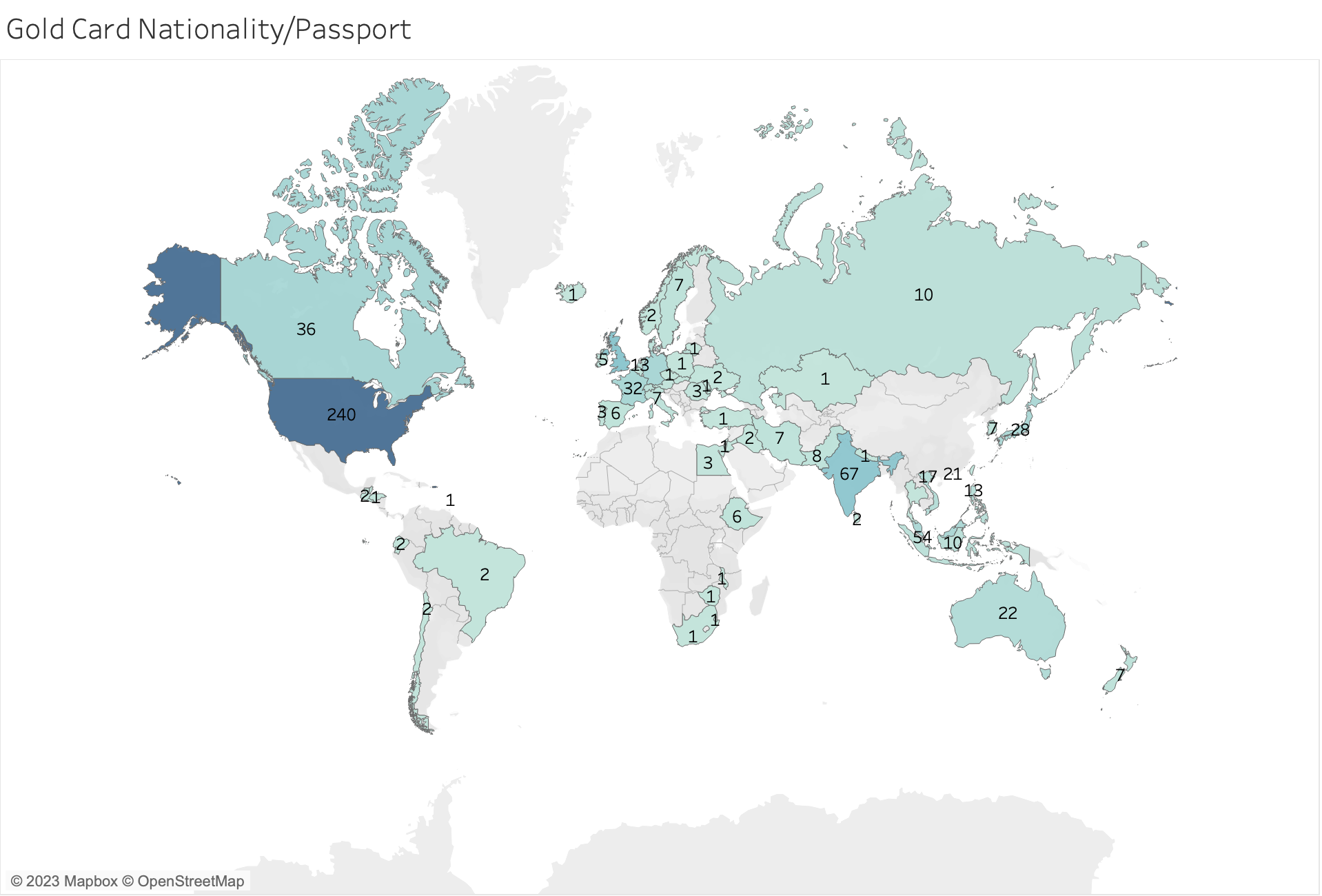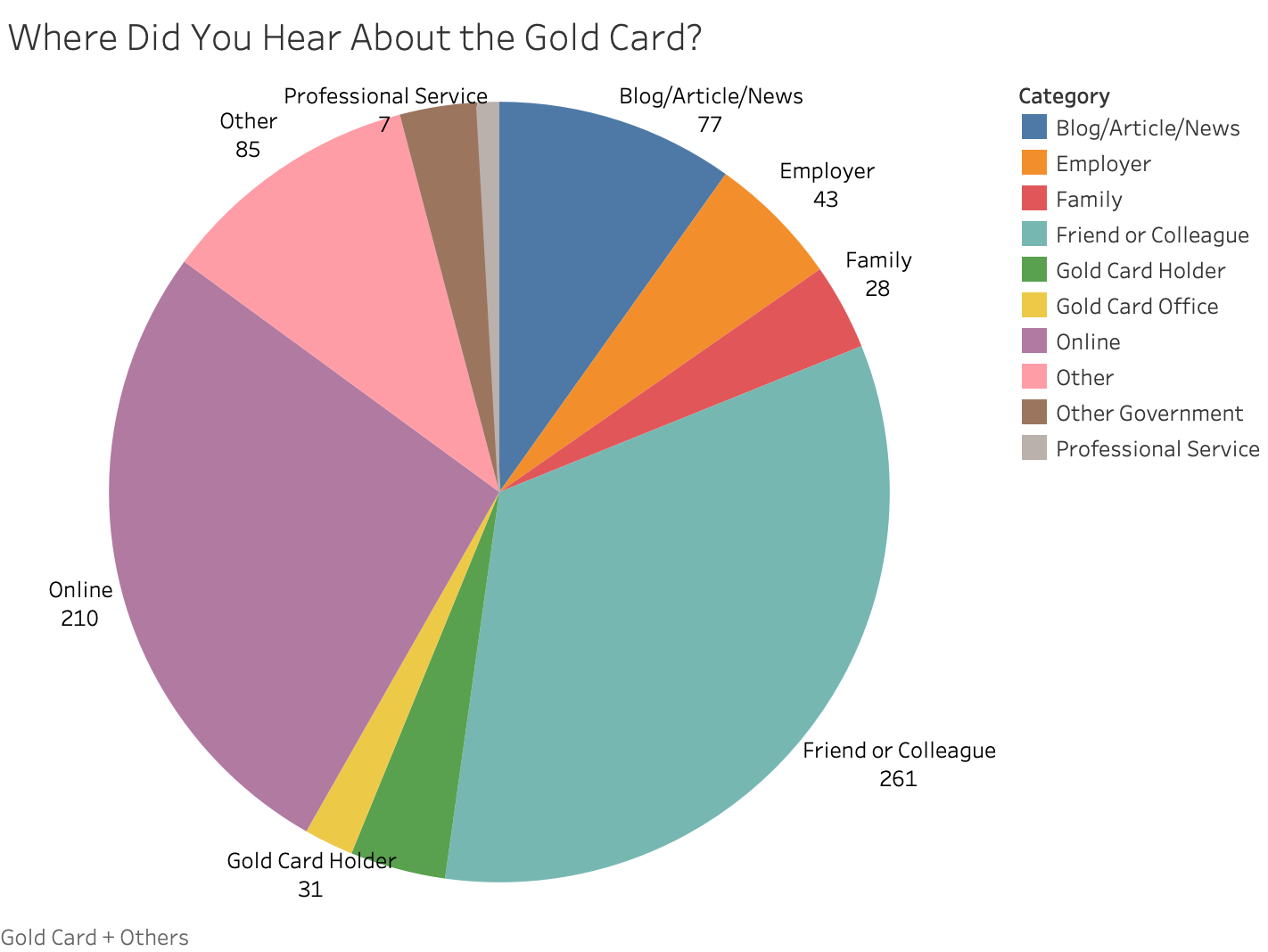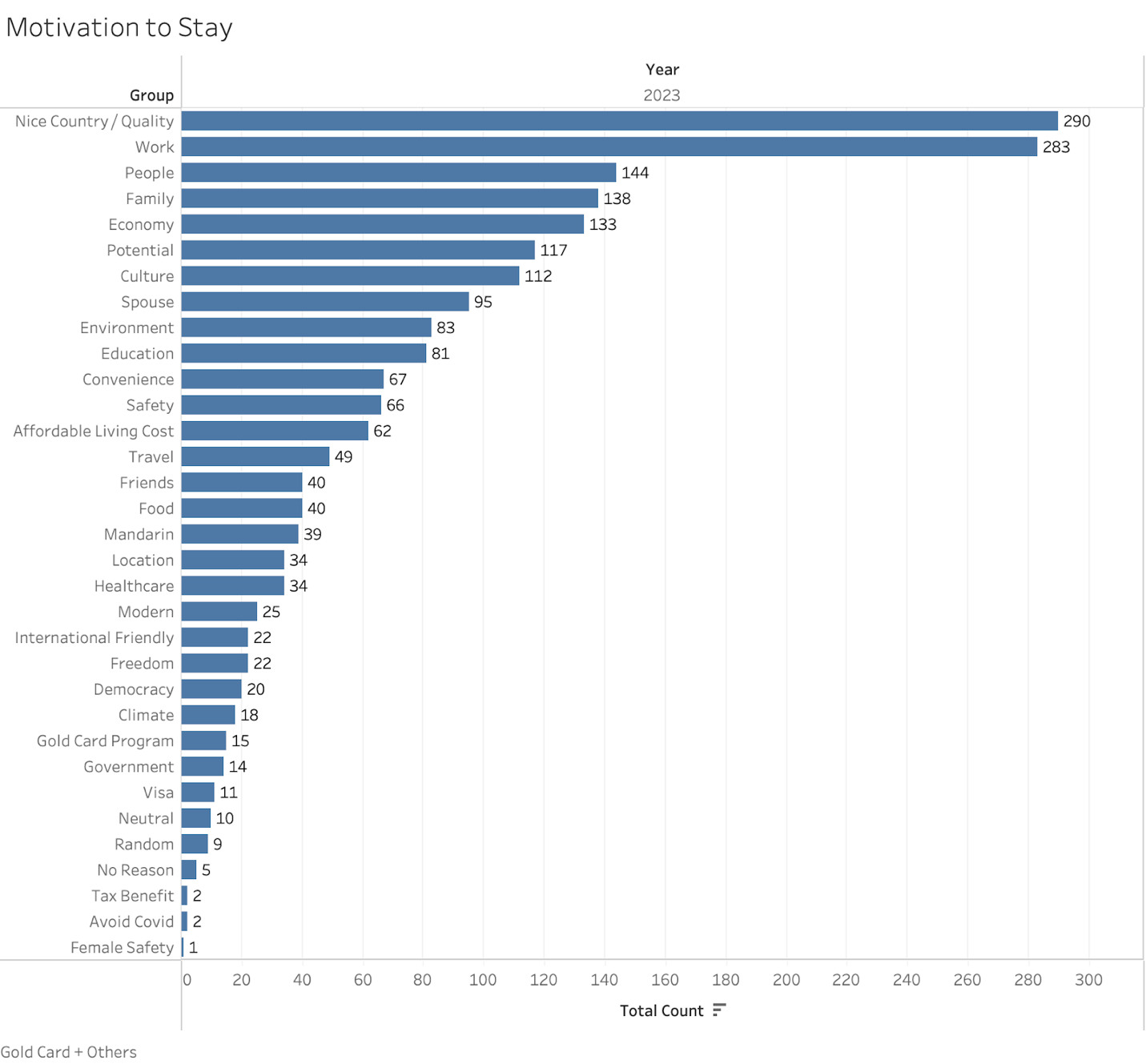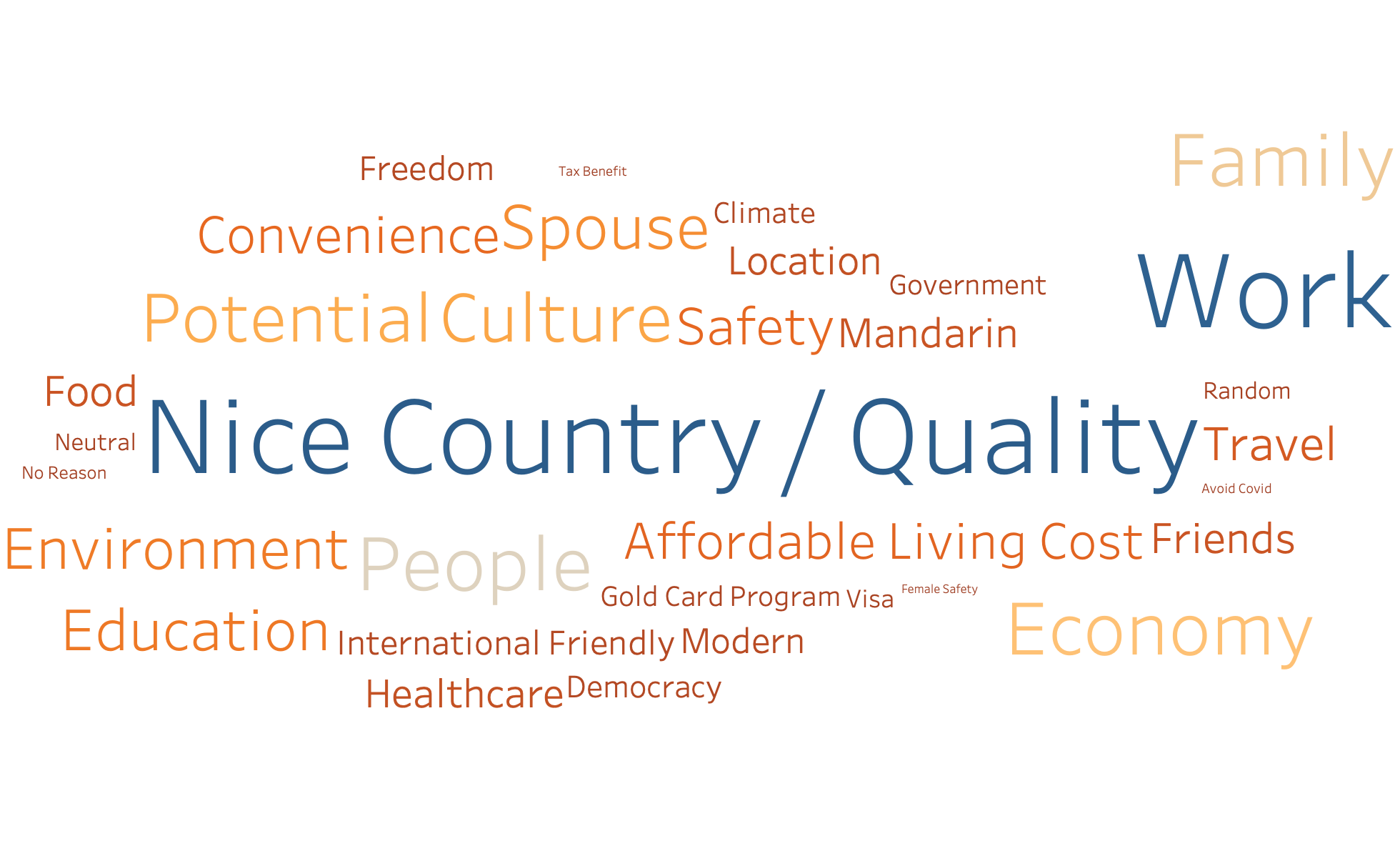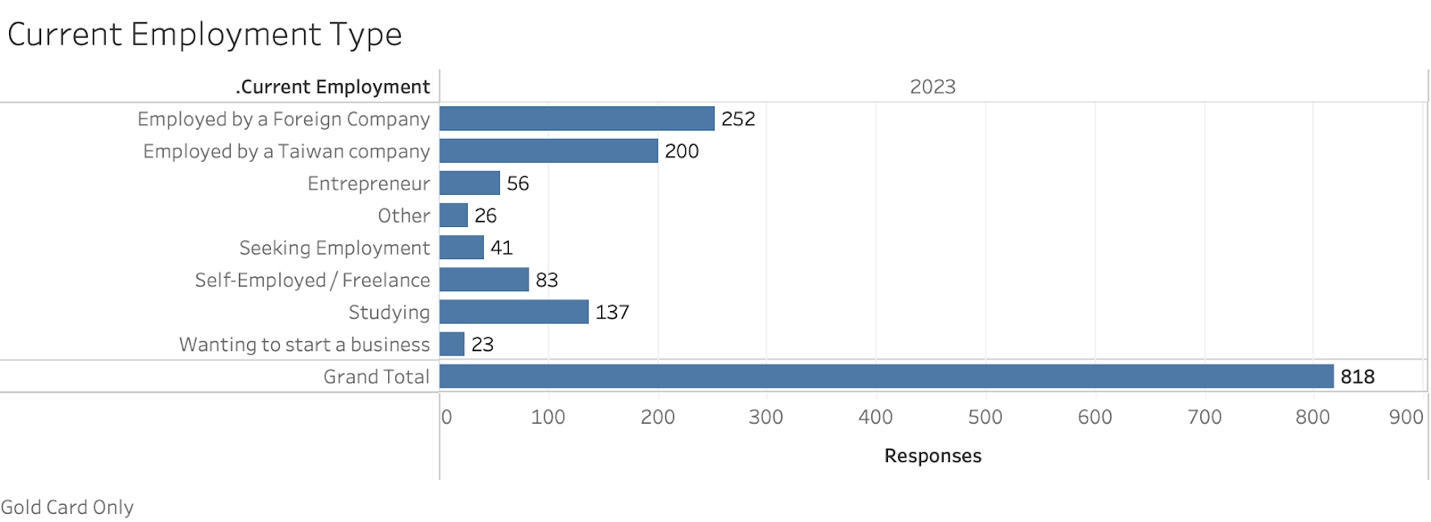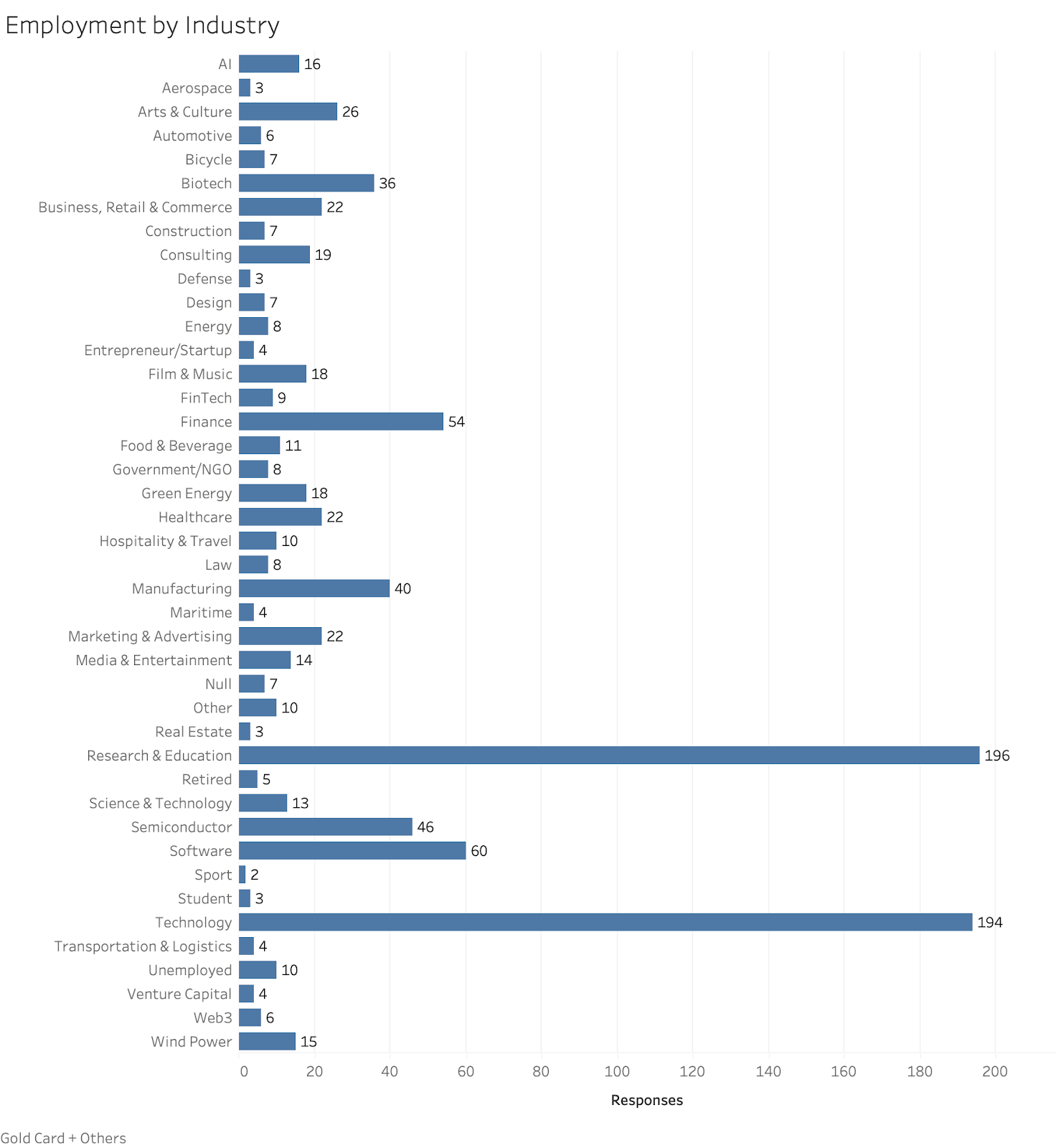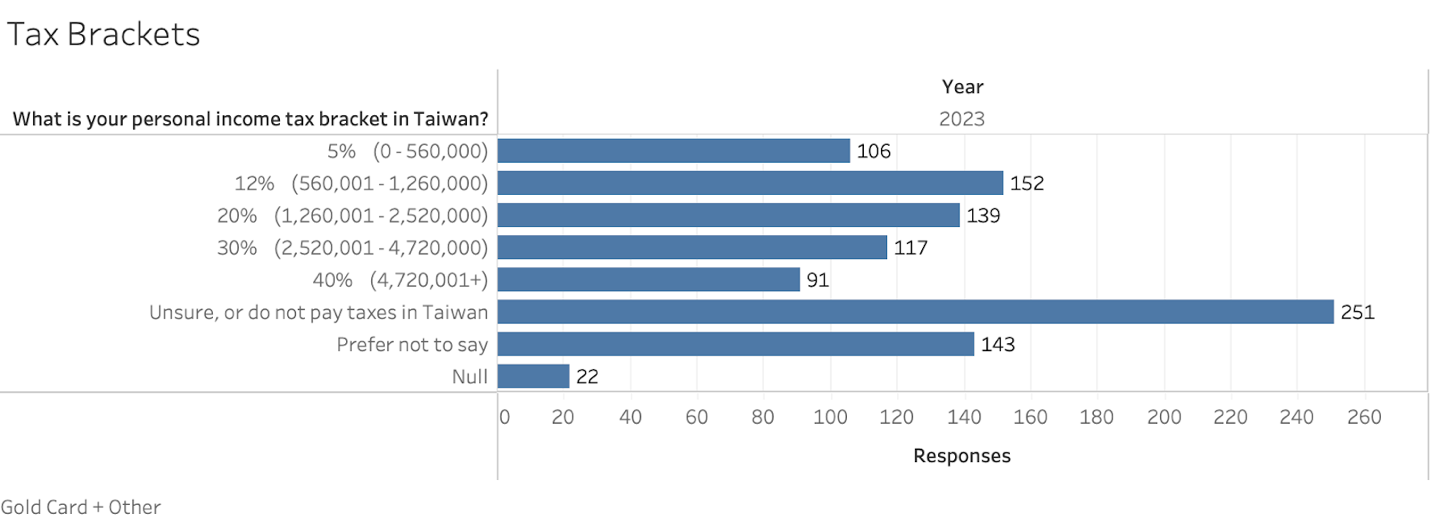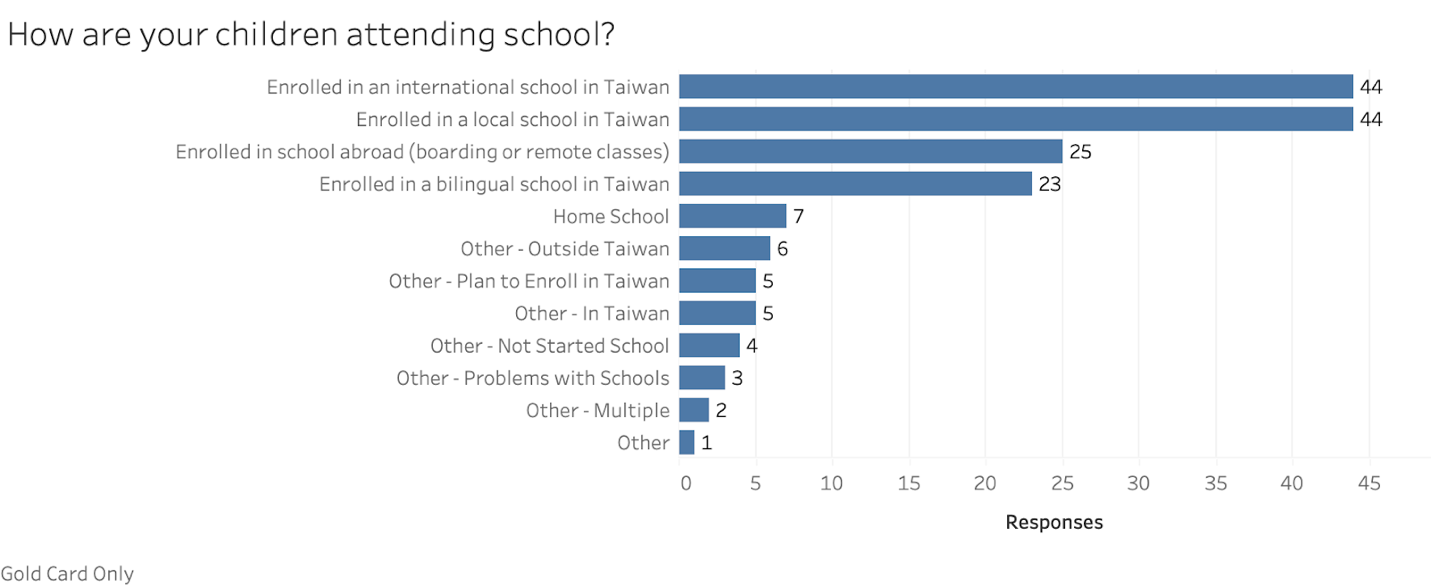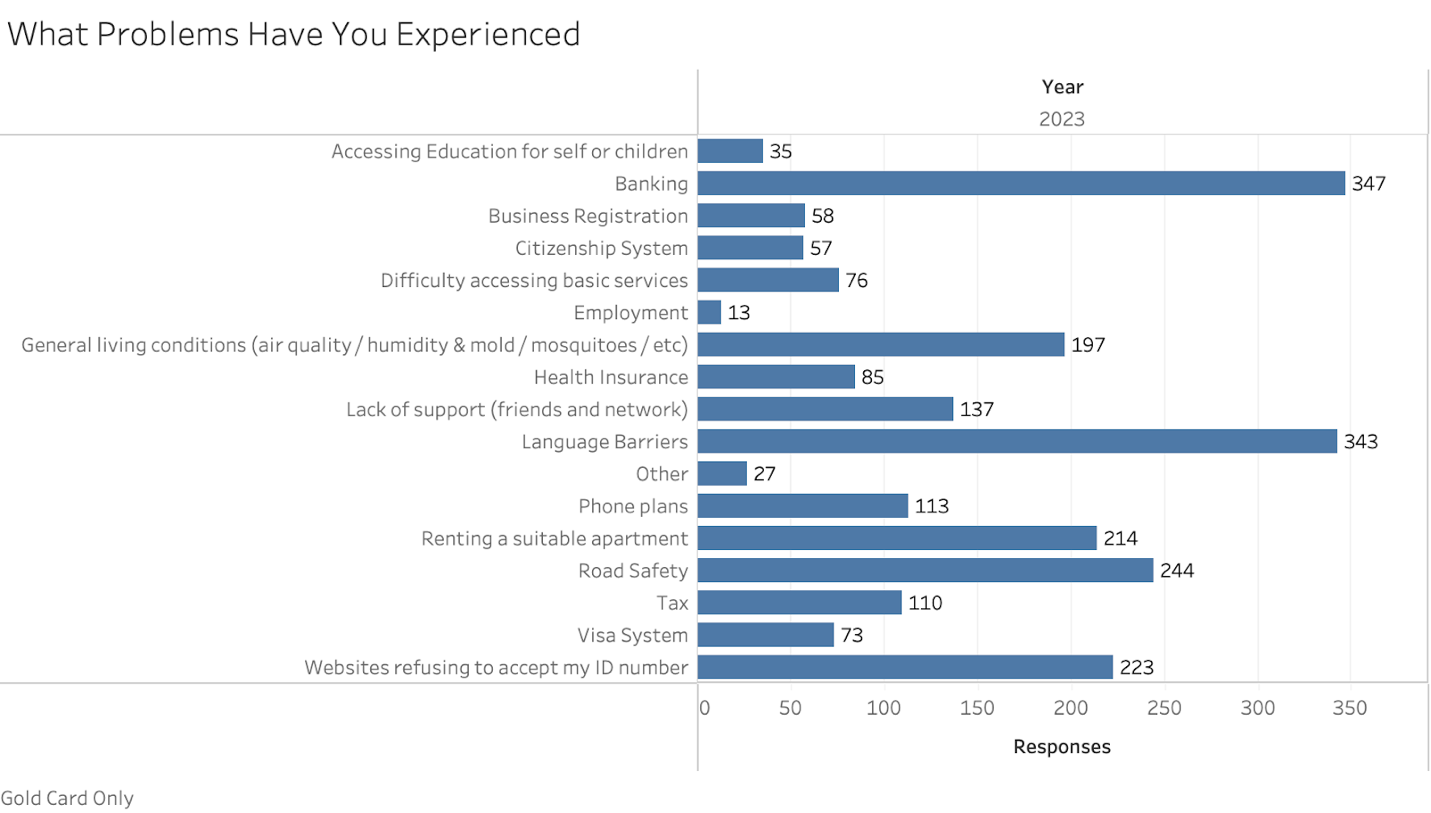
2023 Gold Card Community Survey
From July to August of 2023, the International Talent Taiwan Office (previously the Taiwan Employment Gold Card Office) under the National Development Council (NDC) conducted an annual survey of foreign talent residing in Taiwan. With 1,021 respondents from more than 64 countries, the survey results were collected directly from the foreign talent community through various channels, including assistance from the National Immigration Agency, and while it may not be fully representative of the entire foreign population, it continues to be one of the most extensive studies providing insights into the work-life conditions and viewpoints of foreign professionals residing in Taiwan.
In its third year, this is the first year of the survey where foreign professionals other than Gold Card holders were surveyed. Of the respondents, 81% (827) were Gold Card holders, and 19% (194) consisted of other foreign professionals.
Some highlighted conclusions from this survey include:
- 37% of respondents work in an executive or management role.
- 30% of respondents have obtained or plan to apply for Permanent Residency, with a further 29% considering.
- Banking and language barriers remain the top issues for foreign professionals in Taiwan.
- 62% of respondents expressed interest in obtaining Taiwanese citizenship, if they could also retain their existing passport
- The survey respondents rated their time in Taiwan 8.16 out of 10, indicating that foreign professionals had a positive perspective of their experience living in Taiwan.
With the number of Foreign Special Professionals (which include the subset of Gold Card holders) having reached 12,000 as of October 2023, and a further 56,000 Foreign Professionals, it is important to continue the collection of data and feedback of these new migrants to Taiwan. The National Development Council, along with other ministries, remains committed to evaluating measures that can further transform Taiwan into an increasingly appealing hub for skilled professionals. We continue to welcome feedback on this topic, and caution against using the data out of context.
NOTE: In this report, Foreign Professionals, Foreign Special Professionals, and its subset of Employment Gold Card holders, are defined according to the Act for the Recruitment and Employment of Foreign Professionals . The collective group in this survey are referred to as foreign talent or foreign professionals.
DEMOGRAPHICS
The survey was conducted from the beginning of late July to the end of August 2023 with a total of 1,021 respondents. The survey targeted Gold Card holders and foreign professionals in general. According to the survey, 81% of respondents were Gold Card holders. Nearly 62% (631 people) of the respondents are on their first Gold Card and 12% (124 people) have renewed their Gold Card. Additionally, around 2.4% (25 people) have gained permanent residency status via the Gold Card’s fast-track process.
More than 64 countries are represented within the survey; the top five nationalities of respondents are from the United States of America, India, United Kingdom, Singapore, and Germany. The respondent’s nationalities mirrored the statistical data derived from Gold Card applicant information, with the top ten countries of applicants also represented in the survey.
The 2023 findings supported results from the 2022 and 2021 survey, revealing again that Gold Card holders are frequent travelers. In the 2023 results, 56% of respondents reside in Taiwan, while 24% reside outside of Taiwan but spend a significant amount of time in Taiwan throughout the year. The remaining 20% consider themselves global citizens.
DISCOVERING THE GOLD CARD PROGRAM
The Gold Card program is part of a nation-wide objective for talent recruitment, with a target of 20,000 Foreign Special Professionals by 2030. As we enter its fifth year, we have gathered a significant amount of data and insights into how foreign professionals become aware of the program.
Since the inauguration of the Gold Card program in February of 2018, the majority of awareness has been through “word of mouth”, conversation and discussion with friends, families, colleagues, and employers. More than 32% of respondents heard of Gold Cards through this channel. 26% of respondents heard about the program online or in the media, possibly as the result of TGC office’s engagement to generate more exposure online via blog posts, news, and travel sites. Another 7% of respondents found out about the program through other Gold Card holders, TGC office, and official website.
Respondents have shared their reasons for staying in Taiwan, with the primary reasons to stay in Taiwan are its quality of life (13.9%), work (13.5%), friendly people (6.9%), and family (6.6%). These top four reasons contribute to 41% of the respondents’ answers. Other motivations for foreign professionals to stay in Taiwan include: environment, education, convenience, and safety.
PROFESSIONALS
When asked about their current employment status, the Gold Card holders in the survey reported back that 30.8% of them were employed by a foreign company and working remotely. 24.4% were currently employed by a Taiwanese company and working in Taiwan. 19.8% of the respondents are considered entrepreneurial, either freelancing, self-employed, started their own business or looking to start their own business. 16.7% are currently studying or in research/academia, and 5% are seeking employment.
Similar to the 2022 survey, we asked respondents to provide their job titles and industry with more than 40 different types of jobs represented.
In terms of job titles, we have summarized the responses into five main categories. Many of the respondents have management responsibilities, with 25% holding an executive role (C-suite, Founder, Investor, and, Directors), and a further 14% considered as a manager or team lead. 29% of Gold Card holders were working in a Professional position, while 21% are considered as Academics and 3% as Artists.
We asked respondents which industries they worked in and two of the leading answers are in Research & Education (19.2%) and Technology (19%)
When asked about how much tax each respondents were paying in Taiwan, 20% of respondents reported that they were in the highest two brackets, denoting earnings more than 2.5 million NT annually. Around 28% of the respondents are paying between 12% - 20% of tax in Taiwan.
BUSINESS REGISTRATION
In the 2023 survey, 59 respondents had completed or were in the process of registering a business. A further 66 respondents were planning to register their business in the future. In terms of rating the business registration process in Taiwan, the respondents concluded that the process remains challenging.
Of the respondents who had or are considering to register business in Taiwan, over half (54%) acquired help in process, such as from third parties, governmental assistance, or foreign chambers of commerce partnerships etc.
FUTURE PLANS
In response to their current plans, 77% of respondents plan to stay in Taiwan for more than one year, while 62% have been residing in Taiwan for more than three years. 30% of the respondents were either had already obtained, or were in the process of applying for permanent residency. A further 29% are considering applying.
In 2022, Taiwan lifted its pandemic restrictions which encouraged more migrants and foreigners to travel again. In 2023, we discovered that a majority of respondent’s immigration status had been through different transitions since they arrived in Taiwan, as some individuals have arrived in Taiwan through student or academic visa, and then transitioned into employment ARCs, employment-seeking visas, or Gold Cards.
Of the foreign professionals who responded regarding Taiwanese citizenship, 15% had obtained or were in the process of applying for citizenship. 62% responded that they would consider applying if they would be able to keep their current passport. This signals an opportunity for Taiwan to consider its dual citizenship policy to maximize growth in population within foreign professional groups.
FAMILY & EDUCATION
Family values play a central role in Taiwanese culture, and Taiwan continues to extend a warm welcome to families considering a move. To better prioritize the services provided to family members, we asked respondents whether they relocated with their families and feedback on their spouse and childrens’ life in Taiwan.
In 2023, about 57% of the respondents moved here by themselves. 36% of respondents moved to Taiwan with their spouse or partner, while 16% of those families moved with their children. The average age of children across all respondents was 12.8 years (a slight decrease of 0.6 years compared to 2022).
Out of a total of 254 children reported in the survey, close to 23% are infants, toddlers, and preschoolers (age between 0 - 5), and 32% are young children (ages between 6 - 12), demonstrating that more than half of the children of respondents are either in pre-school or primary school. Teenagers (age 13 to 18) occupy around 15% of the total; meanwhile adult children (18+) make up close to 31% of the entire chart.
Among those children who relocated to Taiwan with their parents, 81% are enrolled in various types of schools, with 26% in local schools, 26% in international schools, 14% in bilingual schools, and 15% in schools abroad either studying in a boarding school or taking online classes. Children not enrolled include those who are home schooled, not yet started school, and those that plan to enroll in Taiwan in the future.
It should be noted that not all the children included in the survey may have moved to Taiwan with their parents, as adult children over the age of 18 may find it difficult to acquire a suitable visa to move to Taiwan without employment.
Besides children’s education, spouse’s employment rights and opportunity has increasingly been a topic of discussion and increasingly noted. While around 44% of spouses in Taiwan have found employment, 18% of spouses are still looking, with 5% of them having gotten interviews but not been able to obtain a work permit. A simple way for Taiwan to increase its foreign workforce and integrate them into Taiwan’s workforce and economy would be this potential pool of foreign spouses; as their spouses are already in Taiwan, the barrier to work permits for spouses can also be reduced without much risk, and would also result in keeping families together.
To assess the social happiness of these accompanying spouses, we also asked if the spouses who relocated to Taiwan found it difficult to befriend others. More than 89% of respondents have found local or foreign friends, which is a positive sign but still worth noting as 11% responded that they found it difficult to make friends.
PERSPECTIVES ON TAIWAN
There are a range of positive areas that Taiwan has achieved and is still currently working on. Respondents highlighted matters such as friendliness, safety, education, living standards, while healthcare is ranked as one of the highest in the region. However, there are also a number of issues where Taiwan could improve. These issues include, banking, language barriers, road safety, renting apartments, website access for foreigners, and better employment opportunities.
Banking has consistently been reported to be an issue for foreigners in Taiwan, and continues to be at the top of the list of problems foreign professionals have experienced. The Gold Card Task Force team continues to collect complaints and feedback from the community, and continues to discuss these concerns with various banking institutions and governmental agencies to highlight the shortfalls of Taiwan’s banking system and practices. In order to implement change, these improvements and discussion are gradually taking place but certain barriers remain in place. Taiwan still has some ways to go to meet global standards and financial practices of other countries.
Secondly, the issues of language barrier and road safety have increasingly been highlighted by the local and foreign communities in Taiwan. In the wake of these developments, the government has implemented certain policies and laws to curb the growing problems within these two major issues. The Bilingual 2030 policy implemented by the current government has sparked conversations, policy changes, but also increases Taiwan’s employment prospects for foreigners. Not only will English be taught more vigorously in schools, people in Taiwan are encouraged to learn, adapt, and grow with the international community to bring Taiwan to the forefront of globalization.
The importance of road safety has also become a hotly-debated issue. The Executive Yuan has already outlined a four-year plan to address traffic safety in August 2023, and recent changes have seen the government increase penalty fines and punishment for traffic violations. Pedestrians are given more rights and benefits, especially in cities like Taipei. In addition, The Ministry of Transportation and Communications has recently allocated NT$24.5 billion (US$780 million) from 2023-2025 to improve road quality and other measurements to protect pedestrians in the future.
The issue of websites refusing to access foreigner ARC numbers has been a consistent issue across all sectors and platforms. An example of this would not only be accessing banking websites, but also online shopping platforms, which often still do not recognise ARC numbers. This limitation continues to be an obstacle for foreigners to access basic services provided to other Taiwan residents.
Another recurring problem that foreign professionals have highlighted in the past is the home rental issue. Some foreign professionals have found the process discriminatory. The issue is largely due to the reluctance of landlords to rent to foreign tenants for various reasons, language being one but not the only reason. However, this practice not only discriminates against tenants based on their nationality or lack of language proficiency in Chinese but highlights their reluctance to include foreign talents into Taiwanese society. Landlords in Taiwan also assume that foreign tenants may not live in Taiwan long term, or are a ‘flight risk’ and could terminate their contract much earlier than agreed upon. We can only encourage private landlords to seek out more assistance in understanding these foreign professionals and continue to rent to foreigners in the future.
Overall, the survey respondents rated their time in Taiwan 8.16 out of 10, indicating that foreign professionals have a positive perspective of their experience living in Taiwan.
In addition to gathering quantitative data, the survey encouraged respondents to share personal comments about their experiences in Taiwan, both positive and negative.
Some recurring points are inclusivity and employment opportunities in Taiwan. The lack of these two components often reflect negatively on a foreigner’s experience in Taiwan.
——————————————————————————————————————————-
“Addressing discrimination issues in access to basic services and labor markets.”
“Any assistance with removing the barriers to citizenship, in particular the renunciation of my current passport would be greatly appreciated.”
“I hope Taiwan can become an inclusive place to live where there are no differences between how businesses and the government treat foreigners and citizens.”
“I hope Taiwan’s working environment can further internationalize, raise wage levels and be open to people from all nations.”
——————————————————————————————————————————-
Other respondents raised the issue of improving policy that will help foreign dependents to stay in Taiwan long term. These dependents include elderly parents, older children, and spouses who would require more benefits in order for these dependents to stay in Taiwan.
——————————————————————————————————————————-
“I cannot bring my 89 year old widowed mother with me to Taiwan and to take care of her under the current law.”
“I have two older children aged between 20 & 21, who can’t get resident visas and it’s difficult to apply for their visitation again and again.”
“I know quite a few people whose family situation because of lack of employment opportunities for spouses forces them to leave the country.”
——————————————————————————————————————————-
Many respondents chose to provide fun and positive stories from their daily lives in Taiwan.
——————————————————————————————————————————-
“Taiwan’s outdoor community is amazing. I made so many local and foreign friends and learned so much mountaineering, river tracing, rock climbing, cycling, snorkeling…you name it, Taiwan has it all. There are exceptional local veterans in Taiwan’s outdoors and especially river tracing is such an awesome activity so unique to Taiwan. Unfortunately Taiwan’s tourism bureau really doesn’t know how to market it. Also 愛玉. I just flippin’ LOVE 愛玉.”
“I lost my student easycard when renting a YouBike with 1000NT on it and it was returned to the university with all the money still on it even though I was not too close to the university when I lost it. For someone to go out their way and return it made me appreciate Taiwanese honesty and helpfulness!”
“When I started working at my current employer last August, they were not familiar with the gold card program. They were pleased to find it was very easy to start my employment. They said it was just like hiring a local person!”
“When I got my gold card, I traveled to Taiwan (during covid!) we got to the immigration line and I got to go through the citizen and ARC line, and the thing that sticks with me so powerfully, is the attendant took my gold card and looked at me, approved my entry and said ‘Welcome Home’. I am a citizen of the United States, and my immigration department interrogates every last person to enter their borders, I teared up at that entry point with that ‘welcome home’. lots of love for Taiwan’s immigration personnel. Basically every time I’ve been in Taiwan I’ve never really felt treated like a foreigner. I’ve been extended the same kindness as family and that is amazing.”
FURTHER STUDIES
The Gold Card Office will continue to conduct this annual survey in order to analyze more trends across the years. The Gold Card Office is also interested in collecting more detailed information about why Gold Card holders choose to continue their stay in Taiwan, how many are successful in applying for Permanent Residency, and also if the government’s continued efforts at adapting a foreigner-friendly environment is successfully attracting foreign talent to Taiwan.



